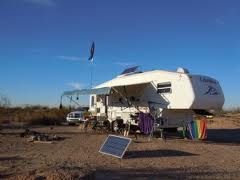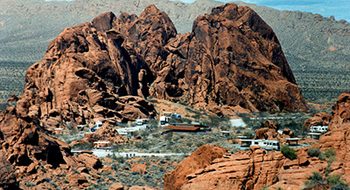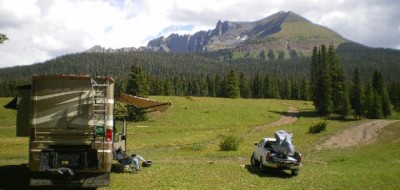By Bob Difley
 Almost every new RVer or former weekender thinking about going fulltime asks the question “How much does it cost to live fulltime in an RV?” The answer is, pick any number and you will find someone who says that is what it costs. And they’re right–for them.
Almost every new RVer or former weekender thinking about going fulltime asks the question “How much does it cost to live fulltime in an RV?” The answer is, pick any number and you will find someone who says that is what it costs. And they’re right–for them.
However, that is probably not the best question to ask. Try rephrasing the question to “I will have a net income of (fill in the blank), will this be enough to cover the RV lifestyle that I define?” And that, of course, implies that you have to first define the RV lifestyle before you can cost it out.
What does costing it out entail? This question is very individual, which only you–and your traveling companion or spouse, if any–can answer. So get out a piece of paper or open a new document on your computer and answer these questions first:
- Is your RV paid for or will you have to factor payments into your budget?
- Is your RV old or new? An old RV will require more dollars budgeted for maintenance and repairs?
- Do you have a residence that will require maintenance or will provide additional income by renting?
- Are all your financial obligations paid off or will payments–other than monthly usage of credit cards–have to be factored in?
- Add in health insurance and prescription drug plan premiums, and average monthly co-pays.
- Add in cell phone costs, a gift budget, hobby costs, and anything else that will be recurring expenses.
That was the easy part, numbers that are simple to come up with and are fairly accurate. Now the harder part.
- Food costs. This includes cooking in and eating out. What are you willing to establish as your eating habits in your new RV Lifestyle? Will you be content to eat out one a week, or are you accustomed to eating out frequently? The difference is huge in what your food costs. Restaurants = high, cooking in with fresh farmers market fare and local food = low.
- Camping. Are you comfortable with and enjoy boondocking on public lands or do you prefer campgrounds? Again a huge difference. RV resorts with golf, activities, rec room, full hookups, internet = expensive. Boondocking in the national forests and on BLM land = cheap to nothing. If somewhere in the middle, decide on how many nights a month you will stay in campgrounds and at what price level are you comfortable with and how many nights boondocking. Keep to whatever plan you work out.
- Fuel: Make a plan on how much you will spend on fuel each month. Stopping for only one night and then moving on and a “I want to see it all now” agenda = expensive. Staying in one place for a few days or a week and exploring the local area = cheap.
- Urges, whims, habits. Are you willing to part with some of these that you exercised when your income was higher, or are you unwilling to change?
- Define a dollar amount for emergencies–whatever figure you are comfortable with.
This is only a start. Write out every part of your preferred RV lifestyle as you define it or how you want to live it, then put dollar amounts to it, then figure out what that lifestyle will cost. That will be your personal plan and will not apply to anyone else. From there you can alter it to: (1) Reduce some part of it to fit your income, (2) Continue working until you have what it takes to pay for your defined RV lifestyle, or (3) Figure out how you can add to your income by part time or seasonal work, running an income producing website or online business, campground hosting to reduce your campground costs, or caretaking.
Whatever you decide, if you can stick to it–that is what it costs.
Check out my website for more RVing tips and destinations and for my ebooks, BOONDOCKING: Finding the Perfect Campsite on America’s Public Lands (Kindle version), Snowbird Guide to Boondocking in the Southwestern Deserts (Kindle version), and 111 Ways to Get the Biggest Bang out of your RV Lifestyle Dollar (Kindle version).
HELP! Are there any SEO experts or Web developers among you out there? I have some questions. Email me at bobdifley at gmail or my website email address hrvlcontact at gmail.


Pingback: hair removal products
Pingback: Article
Pingback: Virginia Gillespie
Pingback: Marian Singer
Pingback: TV Stand
Pingback: Michelle Reddy
Pingback: 1 800 number service
Pingback: Wall Brackets
Pingback: personal injury attorney houston
Pingback: flamingodelivery
Pingback: Health Products that are natural
Pingback: teach in Hong Kong programs
Pingback: robe femme fashion
Pingback: Kasey Monce
Pingback: GI Joe Figures
Pingback: casino online
Pingback: Custom Essay Writing Service
Pingback: persianas niteroi
Pingback: Custom Challenge Coins
Pingback: Leigh Conner
Pingback: best beginner credit cards
Pingback: longskate
Pingback: health suggestion
Pingback: website hosting india
Pingback: web hosting
Pingback: domain registration
Pingback: lose weight without diet
Pingback: work as a teacher in Hong Kong
Pingback: lainaa
Pingback: biforked agglutinoscope aziminobenzene
Pingback: antimason beforested antireducer
Pingback: site
Leonard King
WIFE AND I FOUND A 25% PER MONTH SAVINGS IN OUR FULL TIME RV LIVING COMPARED TO OUR HOUSE. TRICK IS HOW MUCH YOU TRAVEL (GAS ETC). OUR 25% ASSUMES A COUPLE THOUSAND MILES PER YEAR MAX. AND A MIN. OF 3 MONTHS WORK CAMPING (FREE SITE).
Gary and Bev Munro
We are full timers and we are having a ball. We can afford to do this because we bought into a couple of groups. We have Holiday Trails for Canada (our resident country) and Coast to Coast for most of our American travel. By having these memberships we can live every two weeks in the Holiday Trails system by moving from campsite to campsite. We never need to be out of the system, just change parks. We bought into the system for about $7000 which included our buy in for Coast to Coast. In our first 3 years (while still working and owning a home) we used the equivalent of $17,000 in nightly dues for our purchase price. We have to pay about $600 a year in dues, so now it costs us about 3 dollars a night to camp in the Holiday Trails System. When travelling in the US our outside of the area of the Holiday Trail Parks Coast to Coast costs us about $10 per night. We do not count food into our expenses and you eat no matter where you live. We never have an electric, garbage, or sewage bill, it is part of our park fees. We do have to consider Diesel cost while towing but even that is much cheaper than “Taxes, upkeep, etc on a house” We have been full timing now for 4 years and have never lived so cheaply.
Clara A
We have camping discounts at RV123.com. Check out our discount of the month: The new Ready Camp Go! card will make your camping experience easier and more affordable than ever. Now you can access breathtaking resorts, premium rental accommodations, RV sites, special offers and resort style amenities at incredible savings! Stay at more than 100 Encore and Thousand Trails RV resorts and campgrounds. Like other discount programs, availability may be limited. Reservations are required. Visit http://www.rv123.com/readycampgo.aspx for more information.
Todd Dunnigan
Me and my family sold our house, paid cash for a 5th wheel and a big diesel truck to pull it and were sure that full timing was going to save us a ton of money.
By the time we paid park fees and bought a lot of extra gas for the diesel pulling a 40ft trailer, it turned out to be a wash. The RV park fees and the gas were pretty much equal to our mortgage payment before and most of our other expenses followed us, like a couple credit cards, health insurance, groceries, cell phone. Unless you’re fulltime boondocking and killing your own food, you’re going to have a lot of the same expenses.
To be fair, I was parking near larger metro areas for my work so the park rates I was paying were higher than average, but if you’re paying 45 – 50 bucks a day to park, it adds up and you’ve pretty much got a mortgage payment on your hands.
Stay monthly in places if possible, monthly rates fall somewhere between cheaper and WAAAAAAYYYYY cheaper than daily rates. That’s one thing that will save you tons over the long haul. It will also help keep your monthly fuel costs down if you’re not criss crossing the country on a weekly basis. Part of the fun of RVing is to be able to hang out and really soak in a place so take your time, it’ll be your biggest money saver.
William Fincher
Great intel.We lived in our r.v.full time during the evacuations during the 07 wild fires in so.ca.Made a bunch of adjustments on living conditions,water conservation,installing 4 large marine batteries in series absorbing volts from a 3 cell solar pac, purchaced from harbor frieght tools for $60.00.
The times we were not boondocking,we stayed in parks honoring our discount from passport america,enjoy america,good sam.
Still learning thanks to your articles and thanks,
Go camp,be safe.
Dave M.
WOW!!!!!! do you have to have an oil well to fulltime?
hoppe
The problem with oil/gas, seems to be that. It’s easy to find, but apparently not worth pumping, at least here in the USA…. Oil Company profits are record breaking. But the pumps here in the US don’t seem to be running all that much.
I’m thinking that we may need to nationalize some of it, or something along those lines, in order to get the prices down a to a reasonable level.
I’ve now heard of not One, but TWO proposals to EXPORT oil FROM the US . One pipeline in Canada, and the other leaving the Tar sands in northern US & Canada, going to the Gulf. When I hear of pipelines going from oil fields to coastal Ports, I smell EXPORT.
Yet the Drill Baby Drill, crowd Screams that We/US won’t let them drill.
OPERATE the wells you’ve already drilled or get the Hell OUT.
Manuel Enos
There is not a limited amount of gas in the world. Only if you listen to what the green crowd and the government is saying..There is more oil under the ground in the USA than the rest of the known oil producing ntations put together. We have a president that is a lean, mean, green machine lover and will not alow drilling to get it!! I believe in alternative means of power but until we are able to do it in a posivtive manner without costing an arm and a leg we need to explore all means..Obame wants (and the environmentalist) to just shut off the oil now and we can go back to horses…Nice but they don’t understand that they will have to give up everything that they own that requires power in todays world..I have a few friends that work in the oil exploration business – not in USA any more since they can’t drill for it here…They have pulled up their rigs from the gulf and gone elsewhere!!!
Teri B
Bob, some great tips for testing if we can afford full timing and HOW we can do it. Comments were helpful too. I might add that when you are staying at a park and you see something that you can improve, make the suggestion to the park operator. At our park we’ve had guests make us signs, make a nature trail, begin a community garden, design doggie bag boxes, clear out a particularly good fishing spot of brush, etc. in exchange for some trade out or reimbursement. If you develop a good idea it can be marketed to other parks as well and help support your RV lifestyle. I’ve also seen many of our guests offering their particular craft for sale to fellow campers with the parks permission. There’s some really crafty RVers out there.
Gary
oh yea! I will. We traveled for ten years in Europe and it was cheaper than staying home. Free camped everywhere, except when laundry was necessary. Did stay in Portugal for 6 months, but the fee was sooo cheap. 50.00 US/ mo.
Now, we can’t even think about it. The Euro and assorted costs have risen way beyond our means. Travel in the US is really good , IF you can stand to be without all the luxeries that you have at home. Cost be damned. If you can afford it ,go! I realize that many people don’t worry about the costs and there are many who do. Your good advice and info should hit home. Set still and save money. Go and be gas poor. Probably the best word you have given is set your goals, whatever they may be. One little unexpected happening, such as a unforseen surgery can ruin all. Simple things require different actions. A gall bladder attack can set you wondering. Is our rig too small for a nice recovery, or do I rent, or sponge off someone. Take into account the health of the travelers and distance to help. We don’t , as help is always available, no matter where you are. But you must think ahead at all times.But don’t miss all the fun of full-time. PLAN. PLAN, PLAN.
Fred Wishnie
Excellent article that identifies our different situations and the things that have to be taken into consideration.
Jerry X Shea
Join RV Camping clubs/associations. Most important of all “front load” your camping costs. That means, pay to join Coast to Coast, Resorts of Distinction and Resorts Parks International (stay away from Thousand Trails – just ask someone). While this can cost you 3K-5k up front, depending on what package you buy, if you are really going full time it will pay off in the long run. Think of it this way. If you have to pay $35-$45 to stay some place, and I am parked right next to you and my cost was “0” or $10, which do you think is the better deal. Right now I am parked at an RV park right on the beach for a week. My cost $70 for the week. Others around me are paying $45 a day – that is $315 for the week. Our cost for travel since April of this year has been an average of $13.47 a day (parking fees). We had one run of paying “0” for 10 weeks. You can not go full time and pay regular RV fees. Talk to other full timers and they will tell you the same thing.
Caravan
One things for sure there’s a limited supply of gasoline in the World and there’s only one way the price is going to go long term.